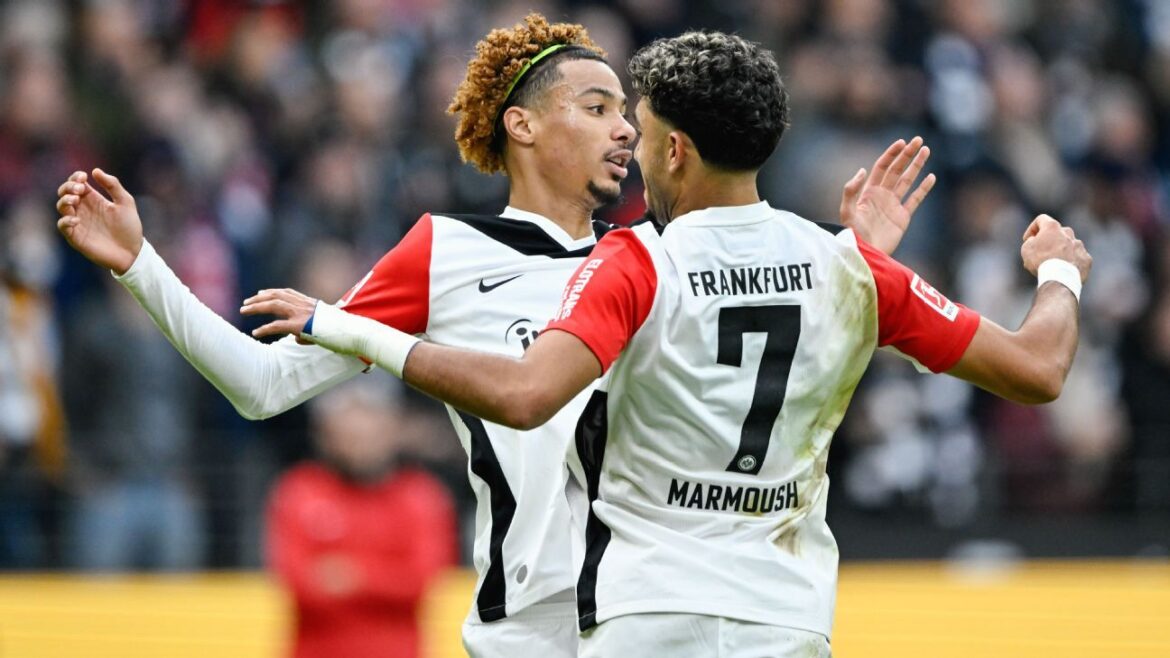The international break was looming at Eintracht Frankfurt with a fairly drab goalless draw against Mainz beckoning. When Ritsu Doan got on the ball in the 80th minute and proceeded to slalom his way past two defenders before dispatching the winner with his preferred left foot, there was an understandable outpouring of joy and relief in the nearby Nordwestkurve, the loudest part of the stadium.
The Mainz game was the very definition of an Arbeitssieg (a win requiring a lot of toil). Indeed, the first half offered little inspiration from either side, and Eintracht’s sporting CEO Markus Krösche later described it as “not having too much to do with football.”
Eintracht have placed the emphasis on keeping the opposition quiet in their past two competitive games, and with good reason after suddenly becoming one of the most porous teams defensively in the Bundesliga, and that concerning pattern extending into the UEFA Champions League. Three conceded at Bayer Leverkusen started the unwanted trend and it worsened with four against both Union Berlin and Borussia Mönchengladbach and then five Gegentore against both Atlético Madrid and Liverpool on the continental front
You simply can’t win games shipping goals on that scale, hence the shift at Napoli recently to what opposing coach Antonio Conte likened to German catenaccio.
Eintracht Frankfurt represent, for me, one of the can’t-miss clubs in world football yet they remain weirdly underrated. Walk through the Frankfurter Stadtwald (city forest) on a matchday and you’ll feel the passion as you pass thousands eating their ritual matchday bratwurst and contemplating the game. Once inside, when you spend a few minutes in the club museum, your heart beats faster as you sense the history. Then if you speak German, you stroll outside again and enjoy the fans’ live talk show that is the Waldtribüne, replete with guests pertinent to the club.
If all that’s not enough, listening to the evocative club anthem — “Im Herzen von Europa” — being sung with pride makes you feel like you were born on the banks of River Main, even if you weren’t. This is an emotional club with a story to tell.
The story last season was a hugely positive one. Third place in the Bundesliga for Dino Toppmöller’s team was no mean feat, especially having transferred Omar Marmoush to Manchester City in January.
When Hugo Ekitike departed for Liverpool in the summer, it was clear that expectations would have to be tempered, but did we anticipate such a marked dropoff? After all, the core of a strong squad remains intact, and Jonathan Burkardt, the local boy born in nearby Darmstadt, was a prize signing for €22 million before add-ons.
Burkardt himself hasn’t disappointed. Far from it, indeed, he was named Bundesliga player of the month for October on the strength of doubles against SC Freiburg and St. Pauli.
It’s often overlooked that strikers come in all manner of different styles. Marmoush and Ekitike, with their pace and movement, were classic counterattacking forwards, feasting on the Umschaltmomente (transitional moments) in a game. Burkardt is a more traditional center forward with sharp fox-in-the-box instincts, yes, but also the first line of defense gegen den Ball (against the ball.)
Even though the 25-year-old himself has impressed, it can take any team a while to adapt to a different reference point in attack. Even with the same formations as last season in place, this has to be taken into account.
There is also the simple fact that certain players have been formschwach (off the boil) in this campaign to date.
Kauã Santos, the keeper of their future, returned from six months out with a torn ACL, and more or less immediately lost his place to summer signing from Werder Bremen Michael Zetterer.
Robin Koch, now the captain following Kevin Trapp‘s departure for Paris FC, has seen his standards slip to the point where Germany manager Julian Nagelsmann had no choice but to leave him out of his November squad. To be fair, Koch has been back to his more reliable self in the past two matches, but too late for Nagelsmann.
You can go down the list and find multiple players whose performance levels have noticeably dipped: Nnamdi Collins, Arthur Theate, Hugo Larsson, Ellyes Skhiri and Ansgar Knauff, for example.
Doan, who began his Eintracht career in spectacular fashion with two braces in his first three competitive games after joining from Freiburg, tailed off until his thunderous match-winning contribution a week ago Sunday.
And if there’s an ongoing problem area, it’s the substitutes situation up front. Neither Elye Wahi nor Michy Batshuayi seems ready to make a significant contribution. Wahi has yet to score in 17 total Bundesliga matches.
Yet for all the below-par performers, there have been individual success stories. The best belongs to Can Uzun, who has starred with five goals and three assists before having to go off recently at Heidenheim due to a muscular injury and has been out ever since.
Farès Chaïbi has become overall a more complete midfielder. Eintracht have been patient with him and he has repaid the faith with five Bundesliga assists.
Denmark international Rasmus Kristensen, with his consistency on the right, has rarely let Eintracht down this season.
Frankfurt’s next test is an intriguing one, just a one-hour train journey away against another Traditionsverein (tradition-based club) FC Cologne under the Saturday night floodlights. It’s the start of a busy spell leading up to Christmas that includes key confrontations in the Bundesliga and Champions League against the likes of RB Leipzig, Leverkusen, Atalanta and Barcelona.
Will Toppmöller’s team be able in the forthcoming contests to marry the high-tempo, easy-on-the-eye football from last season to the defensive solidity of the Napoli and Mainz matches? My own feeling is that despite the autumn wobbles, the only way is up for Eintracht, and I won’t be surprised if they end up landing in Germany’s top four come May.
